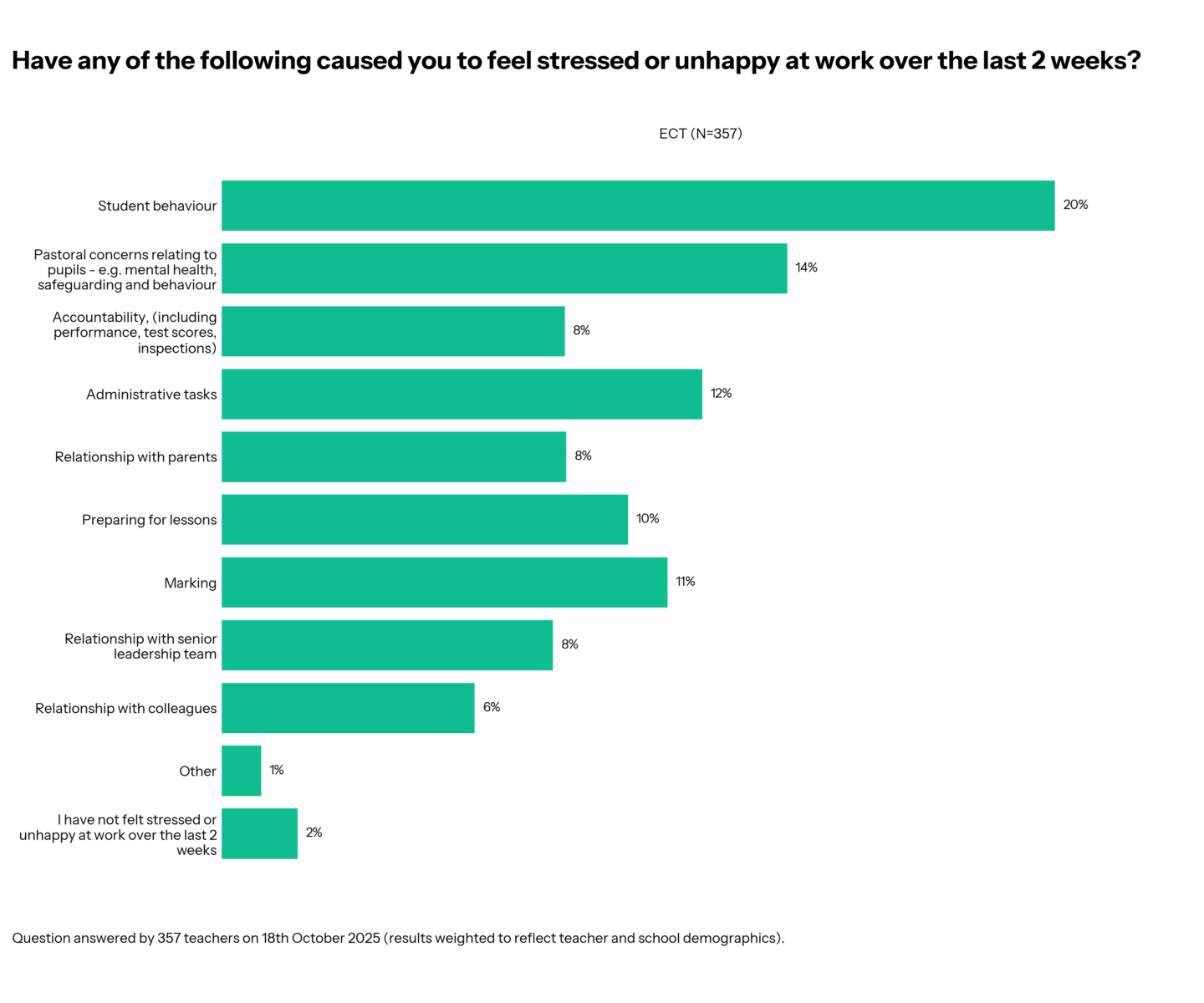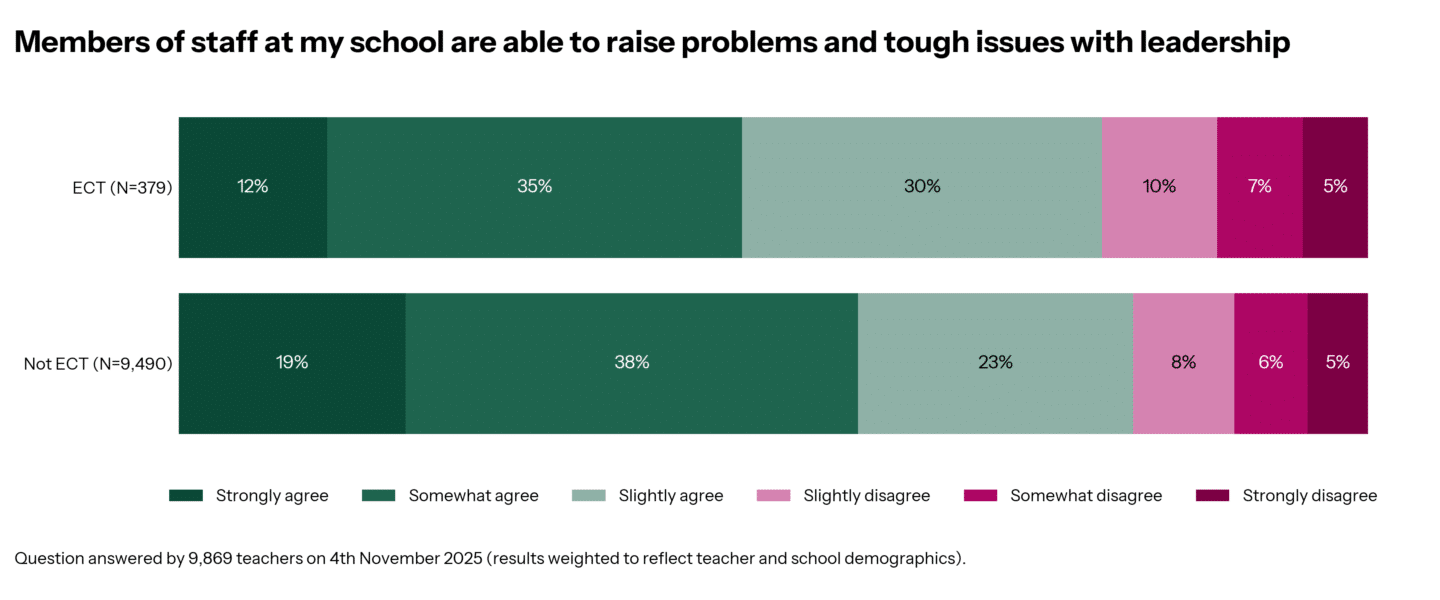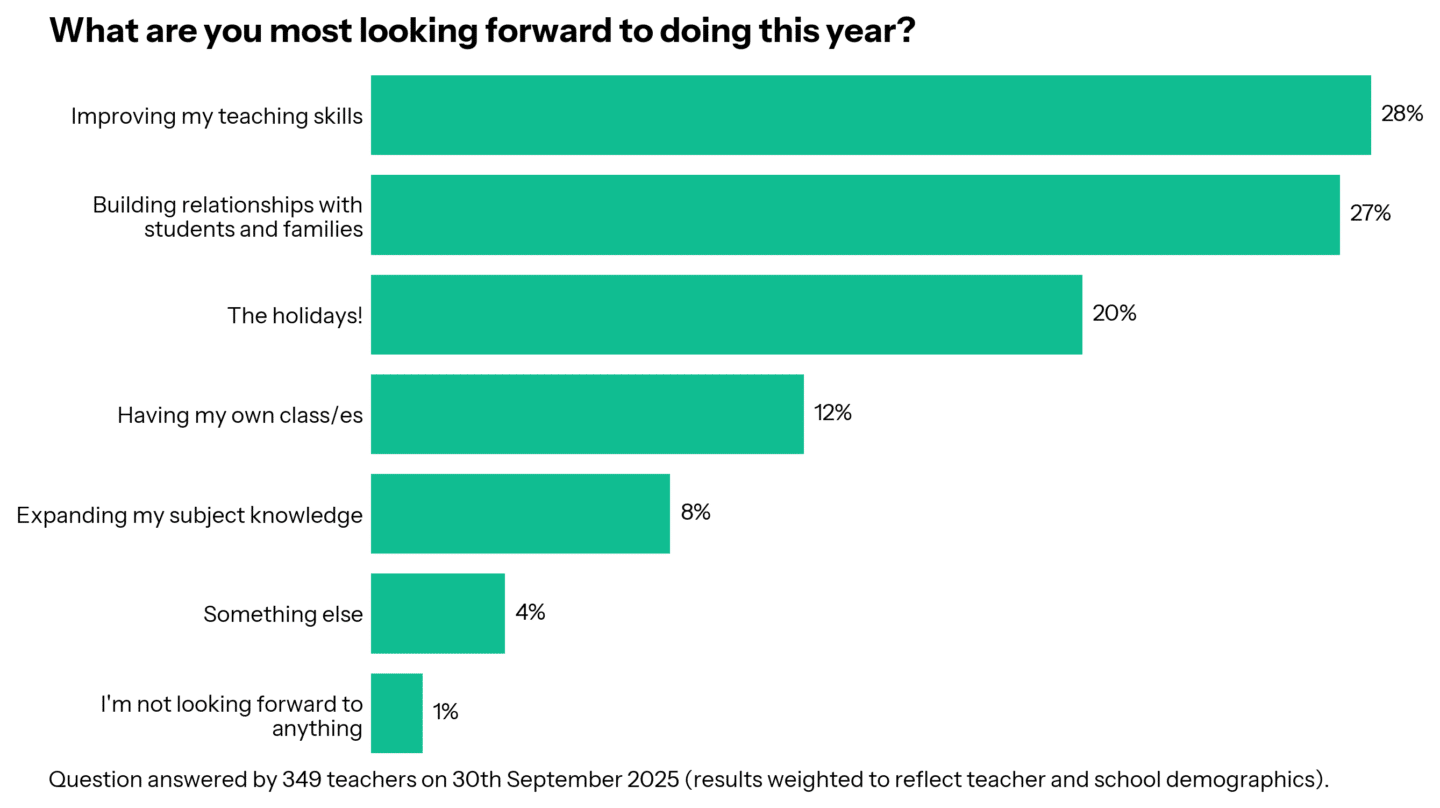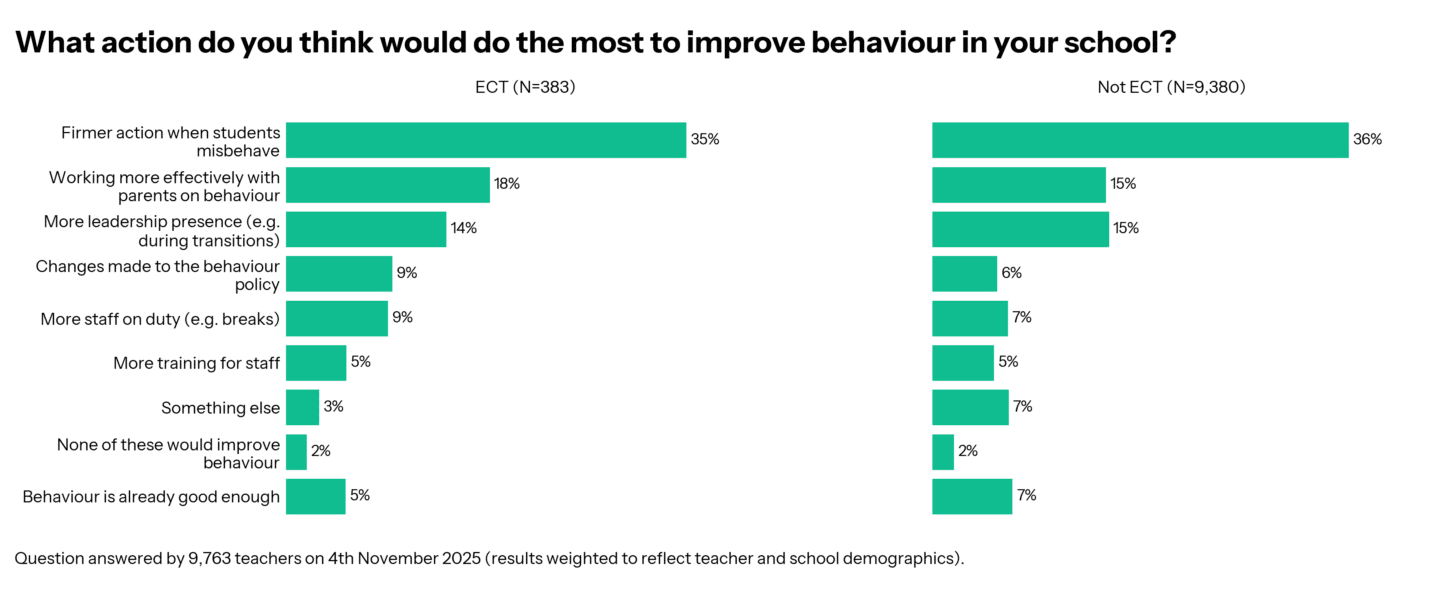
Well done, ECTs! The autumn half-term is done, you are one step closer to completing your journey. Here at Teacher Tapp we have been tracking your progress – the ups and downs, and delving into the detail of your support.
Has your experience matched that of other ECTs? Read on to find out…
1. 🎢 ECT Expectations vs Reality
When asked before starting, behaviour was by far the biggest concern (42%), followed by pastoral issues (15%) and accountability pressures (12%). And this makes sense! After all, all the training can prepare you for these aspects of classroom life in principle, but it’s real-life experience that builds confidence in knowing how to face them.

But there are some interesting shifts once term is underway… 👇
What ECTs actually experienced
Once the term was underway, we asked about what things were causing stress and unhappiness, and here there was a noticeable difference between the two.
Although behaviour still dominated, pastoral concerns (14%) and admin tasks (8%) were significant sources of stress.
Before the term started, only a small number identified marking and planning as potential sources of stress. But now the term has properly begun, a significant number of ECTs identified marking (11%) and planning (10%) as a source of strain, possibly suggesting that these are bigger sources of strain than ECTs had anticipated.

And if you are an ECT worrying that ‘this is just me’, then stop right now! ALL teachers found behaviour a challenge! Non-ECTs also found behaviour to be the biggest challenge (16%), and just like ECTs, only a teeny number didn’t find anything stressful (3%).
What if things are so bad, ECTs need to speak to someone? Well, that might be a bit of a problem. Compared to teachers with more than two years of teaching experience, ECTs are less likely to feel they can raise problems with leaders (12% of ECTs strongly agree vs 19% of non-ECTs).

Although behaviour expectations often align with reality, ECTs are now discovering that pastoral care and admin are hidden stressors. This potentially could erode the early optimism of ECTs. Leadership visibility and early support structures can make a significant difference – so all the more reason for newer teachers to get extra support!
2. Mentors and mentor meetings can be inconsistent
The entitlement to mentor meetings are essential sources of support for ECTs. But are they always taking place in rooms where ECTs can speak freely?
If your meetings have been in places where you can be overheard, then you’re not alone.
- 41% ECTs have their mentor meetings in a separate room.
- 32% can use the same room every time.
- Just 10% have a space booked or timetabled for their use.
Just getting those meetings can be tricky. More than half (62%) of ECTs have had mentor meetings or lesson observations cancelled and not rearranged: more than a quarter (26%) have had a mentor meeting cancelled and not rearranged, and 19% have had the same happen to a lesson observation.
Mentoring time is the one consistent entitlement in the ECF — when it’s eroded, you risk ECTs losing confidence. If you’re an ECT who isn’t getting what you should either in terms of the number of mentor meetings, or a meeting space where you can speak freely, then it’s important to speak up. If you don’t feel you can speak to your mentor directly, then confide in another member of staff who can help you broach the topic with your mentor.
3. ECTs are full of enthusiasm
The start of a new year is always a special time – and the ECTs at the beginning of 2025/26 had LOTS they were looking forward to! In fact – a huge 99% said they had things they were looking forward to this academic year 🙌.
Top of the list of things ECTs were looking forward to was improving teaching skills (28%). After that came building relationships (27%).

However, before you start upping the expectations of ECTs, it’s important to take a look at the behaviour data and what this tells us about the challenges ECTs are experiencing.
Behaviour in class – ECTs are much more likely to report higher numbers of students misbehaving in their lessons with TWICE as many ECTs reporting around half the class or more misbehaved in the last lesson, compared to non-ECTs (18% vs 8%).
19% of ECTs had ‘most’ or ‘all’ complete the last homework they set, but 25% of non-ECTs can say the same.
So, if you’re an ECT who has been struggling with classroom behaviour, you’re far from alone!
4. Thoughts on improving behaviour
So, as the group that sees the most challenging behaviour from students, what do ECTs have to say on the topic of improving behaviour?
Both ECTs and non-ECTs agree on the headline point: firmer action when students misbehave would improve behaviour (35% of ECTs vs 36% of non-ECTs).
But beneath that, there are some telling differences.
ECTs were more likely to choose:
- Working more effectively with parents on behaviour (18% vs 15%)
- More leadership presence during transitions (14% vs 15%, very similar)
- Changes to the behaviour policy (9% vs 6%)

This suggests new teachers want clearer systems and visible support from leaders when behaviour gets challenging — perhaps reflecting their need for confidence and consistency while they’re still finding their feet.
5. The surprising job of teaching
Both new and experienced teachers were united on one thing:
👉 How much time goes on non-teaching tasks and this was chosen by 44% of ECTs and 45% of non-ECTs. So, even seasoned teachers still find paperwork, admin, and planning overwhelming!
But beyond that top response, some differences stand out 👇
ECTs say that they are…
- Less likely to be surprised by how often things change (9% vs 16%).
- More likely to say they were surprised by how much they love the students (6% vs 4%).
- Far more likely to mention how much they’ve learned themselves (13% vs 6%).

It’s great that ECTs are surprised by how much they grow personally; however, if you’re an ECT feeling the overwhelm, the finger of blame can be pointed here! After all, the steep learning curve brings exhaustion. Remember to normalise imperfection while this growth takes root.
Words of advice
When trainees first enter the classroom, they are usually bombarded with teachers giving them advice. But how much of that advice is good advice? We asked our Teacher Tapper ECTs to tell us the BEST advice they have received so far, and then did not disappoint. Over 100 Tappers wrote in, and here are our favourite gems:
“Someone in my first week of PGCE said to learn to live in the tunnel rather than try to see the light at the end. Meaning the deadlines are always coming thick and fast, so pace yourself. I use this daily and leave at 5 every day – never afraid to do the priority tasks and sacrifice the less important ones for another day, or not at all.”
“You set the weather in the classroom. Look after yourself and your emotional wellbeing,” advised one ECT, with another also saying: “Make sure you look after yourself too – happy teacher = happy kids.”.
“No lesson will ever go how you want it to, be kind to yourself and get the idea of perfectionism out of your head early doors,” sensible words from one ECT. Another advised: “This is a performance – the students don’t know your lesson plan, so don’t stress if you missed something out by accident; you can always do it next lesson.”.


